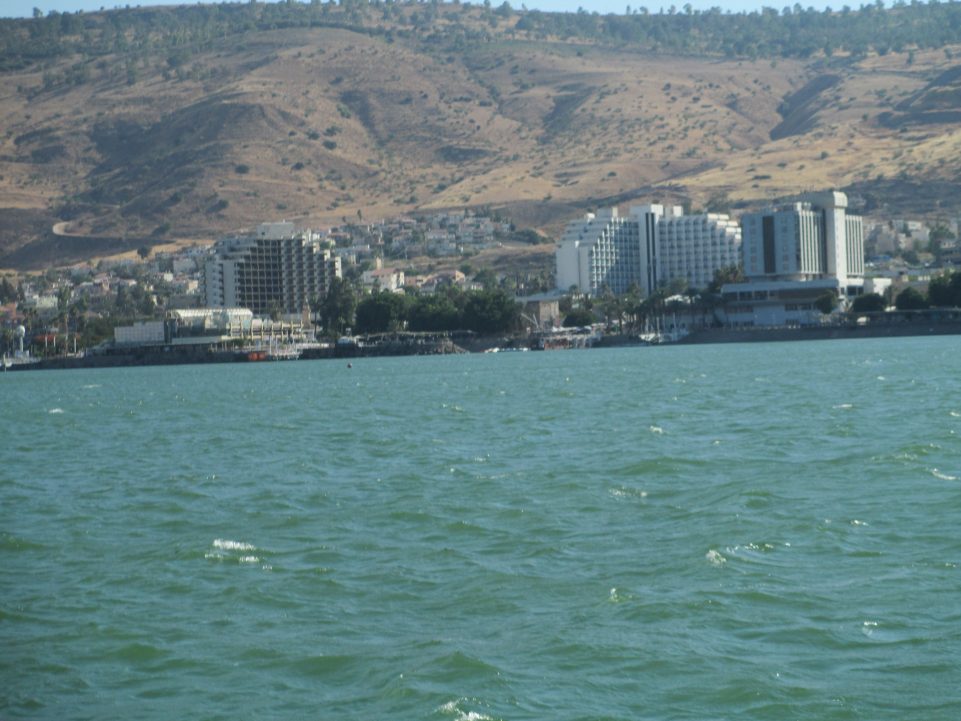Dateline Jerusalem — Israel is an arid country, only 2 percent of it being water.
Lake Kinneret, so ancient it dates to biblical times, is also known as the Sea of Galilee.
The city of Tiberias, below sea level, sits along its shoreline. The Kinneret is the largest freshwater lake in Israel and the lowest freshwater lake on earth, \650 feet below sea level.
It is the second lowest lake on earth, next to the Dead Sea, a salt water lake.
The Kinneret supplies half of Israel’s domestic water. Israel must rely upon reclaimed water and desalination for the other half.
Considering Lake Kinneret is at a dangerously low level, the lowest in almost 100 years, the Water Authority has stopped pumping water from it.
And it isn’t even August, the time of year when it is expected that another centimeter of water will evaporate per day.
Considering rainfall has dropped 30 percent the last few years, the prospect of a speedy recovery of water levels is not on the horizon.
The Kinneret is Israel’s major surface reservoir, supplying our country with fresh water, agricultural water and irrigation water. It also supplements water supplies to Jordan and the Palestinian Authority, as well as sending water to Hamas in Gaza.
Supplying water from the Kinneret was one of the terms agreed to in the peace deal between Israel and Jordan.
Unfortunately Israel cannot make any money on this.
The agreement forces Israel to sell the water to Jordan at cost. Only when Jordan requests over its allotted amount can Israel make a profit.
Although Jordan is aware of the dangerously low water level, so low that it will take 600 million cubic meters of water a year to get back to normal,
Jordan threatened war should Israel discontinue providing it its allotted amount of water.
The downside to selling water to the Palestinians is that they are notorious for not paying their debts. They owe the Israel Electric Corporation almost 2 billion shekels for electricity supplied to them.
However, the Palestinians recently allowed 300 million shekels in tax funds collected by Israel on its behalf to offset some of its electric bill debt.
Further, the Palestinians are charged only discount prices for the water received by them. Israeli citizens must pay more for their water so that the Palestinians can be subsidized at the discount prices.
Is This Fair?
For example, Israelis pay almost twice as much for their water as residents of Nablus and Ramallah pay, if they pay at all.
Too often the media reports that “Israeli occupation policy” denies Palestinians the water they need. Not so!
What do the Palestinians do when faced with an inadequate amount of water?
Not much.
They refuse to participate in a joint water management program with Israel, refuse to develop their own underground water resources, refuse to build sewage treatment plants or desalination plants, and they do not utilize technology to create more usable water.
Nor do they even fix massive leaks in their municipal water pipes.
What do they do?
Illegally, they tap into Israel’s water resources and send their sewage into Israel’s streams and valleys.
A few years ago I visited Rachel’s Tomb. The building next to it was owned by an American woman who came three times a week with plastic water bottles to water the trees and flowers she planted.
She told me that originally there was water to the building but at night, Palestinians dug up and stole the water pipes going to the building.
What does Israel do when faced with such a dire water shortage situation?
Follow the Rules or Else
Israel began a program of water rationing. The allotted amount is based on the number of people in the household. It is increased for additional family members.
If we go beyond our pre-determined amount, we are heavily fined. Although water consumption has gone down as a result, our water bills have become exceedingly high to pay for subsidizing the Palestinians and for desalination technology to convert salt water into fresh water.
Several desalination plants convert both seawater and brackish water into fresh water. Also, wastewater is treated for re-use in agriculture.
Even with technology for desalination and drip irrigation, Israel is facing a dangerous water crisis. But in 2002, Turkey and Israel entered into an agreement for Turkey to sell Israel water for 20 years. However in 2010, Turkey backed out of the deal.
Just as well.
Turkey was charging Israel inflated prices that made purchasing water from them more expensive than desalination.
If Israel is forced to give up any more land for “peace,” it will lose three-fourths of its current water supply.
The mountain aquifer lies beneath Judea and Samaria, mostly in Samaria, commonly called the West Bank.
Eighty-three percent of the recharge areas are on land proposed for a Palestinian state.
In the past when Israel constructed a pipeline to take brackish water from the Kinneret to the Jordan River, Lebanon, Syria and Jordan, tried to divert the Jordan River’s headwaters.
Every time a demand is made to hand the Golan Heights back over to Syria, Israelis dread that it will come to fruition. Most of the Kinneret’s water sources are in the Golan Heights!
If Israel must rely on water sources in the hands of Syria or the Palestinians, there would be a great potential for domestic water contamination and inappropriate water use.
Meantime, Israelis go to Tiberias to pray at the tombs of famous rabbis, to enjoy the music, the art, the food of the quaint town, and to take boat rides out on the waters of Lake Kinneret.
L’hitraot. Shachar

